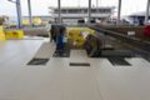Spanish manufacturers of insulating materials in Saxony-Anhalt have increased

Nowadays 440,000 cubic metres of XPS insulation boards are produced there in the four-shift system annually in the factory operated by Ursa, the insulating materials division of the Uralita Group. This quantity corresponds to nearly six million boards with a thickness of 100 millimetres. About 5,000 heavy goods vehicles can be loaded with that amount, says Factory Manager Hendrik Mihls (photo).
The abbreviation XPS stands for extruded polystyrene. XPS boards are resistant to pressure and moisture. “Our boards are outstandingly suitable for insulation of buildings, above all for external walls in the basement area and under the floor slab”, says Hendrik Mihls. He is the first German factory manager in the history of the insulation material factory established by the Spanish firm Poliglas in 1997. Poliglas was completely merged in the Spanish Uralita Group in 1998. Mihls came to the Spanish group as a graduate construction engineer in 2002. Uralita additionally purchased the Ursa insulating materials division from the German construction group Pfleiderer in 2004. Spanish managers have always led the factory in the Saale district. In 2006 the native Saxon became factory manager in Queis. Today he is at the same time also quality manager of Ursa Deutschland GmbH. In addition to the factory in Queis, another factory in Delitzsch for production of glass wool also belongs to the company. Ursa Deutschland GmbH employs a total of 320 employees. They generate an annual turnover of 100 million euros. Ursa Deutschland GmbH is one of the four important providers of insulating material solutions in the German market with a share of about 20 percent in the XPS market.
When Mihls started in the company, one of the hiring criteria was learning the Spanish language. Today English is spoken in the group, since Ursa produces in nine countries meanwhile. The main business is the production of glass wool. XPS boards complement the business with the insulating materials. In addition to Saxony-Anhalt, they are also manufactured by Ursa in Spain, Italy, France and Russia. When a location for a factory in Germany was sought, there were clear specifications, reports Mihls. In addition to the proximity to the motorway and the distance from residential areas, the promotional opportunities valid for eastern Germany also played a role. Finally, the central location in Europe was also important as it means logistical advantages for the delivery of materials to Western as well as Eastern European markets. The Ursa factory in Saxony-Anhalt mainly supplies Germany, Austria, Switzerland and Poland. Smaller quantities also go to the Czech Republic as well as Slovakia. One of the most important markets for the entire Ursa Group is Russia. “It offers the most opportunities, but also entails the greatest risks”, emphasises the factory manager. He refers to the fact that the political stability in Germany as well as the stability of the market is highly valued at the Ursa headquarters in Madrid.
Whether under Spanish or German leadership: the expectations in the Madrid headquarters may well have been met. During the start in Halle-Queis, 16 employees produced 53,000 cubic metres of XPS boards. In the meantime, a second production line has been set up and two expansions have been made to the facilities. Today 65 employees produce 440,000 cubic metres of XPS boards annually. “The factory has been fully used to capacity for years”, reports the factory manager. Twice a year the facility is serviced for six days each. Employees from the factory in Central Germany have been called on during erection and during start-up of factories in Italy, France and Russia. This is also an appreciation for the work of colleagues, believes Mihls, who travels twice a year to the group headquarters in the Spanish capital. There one gladly looks towards Germany and Saxony-Anhalt, since the currently valid energy conservation regulations as well as the coming regulations apply as a growth engine for the insulating materials sector. They require higher and higher insulating performances, says Mihls. The boards become thicker and thicker, which also requires more production time, however.
The Ursa logo shows the silhouettes of two polar bears. With the white fur and the dark skin underneath they are outstandingly “insulated”, explains the 35 year-old. The Spanish company solidifies Saxony-Anhalt’s reputation as a location for international companies.
Contact:
URSA Deutschland GmbH
Uralita Straße 1
D-06188 Queis
Hendrik Mihls
Tel.: +49 (0)34602 54021
hendrik.mihls@uralita.com

